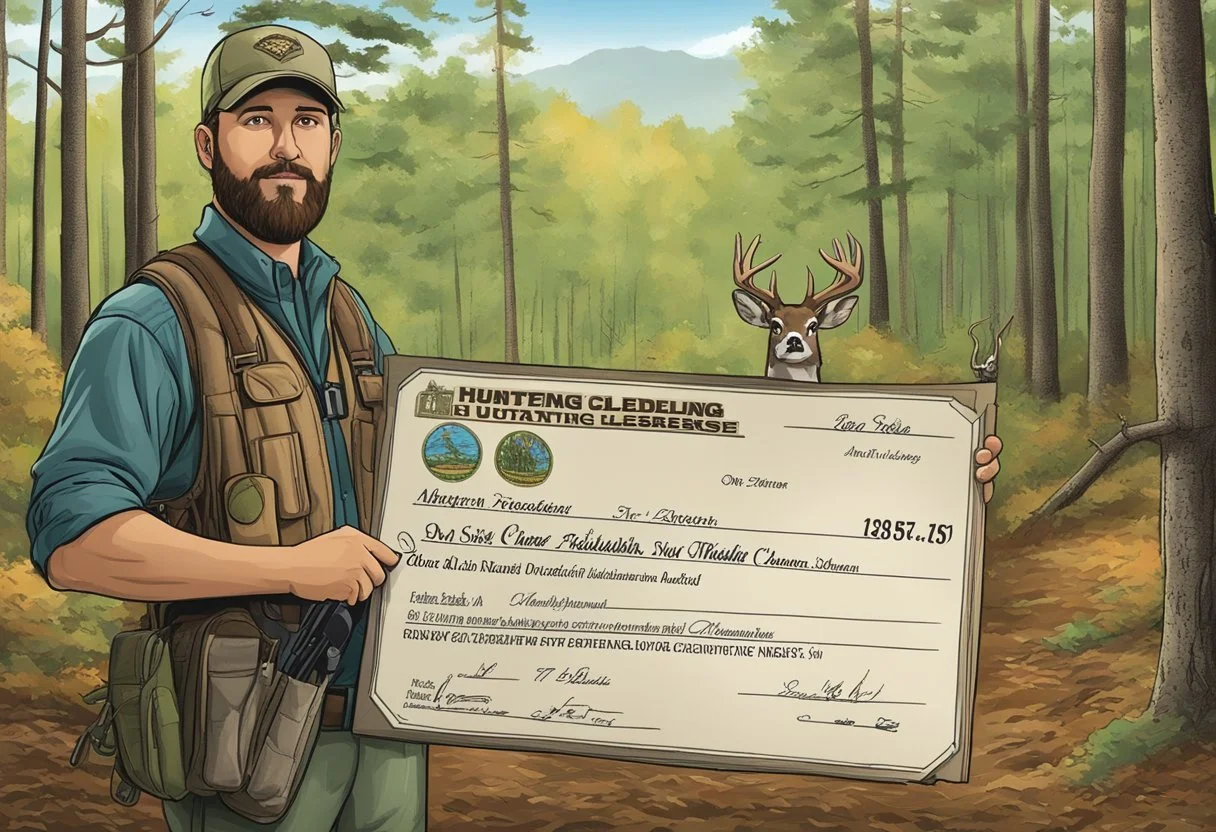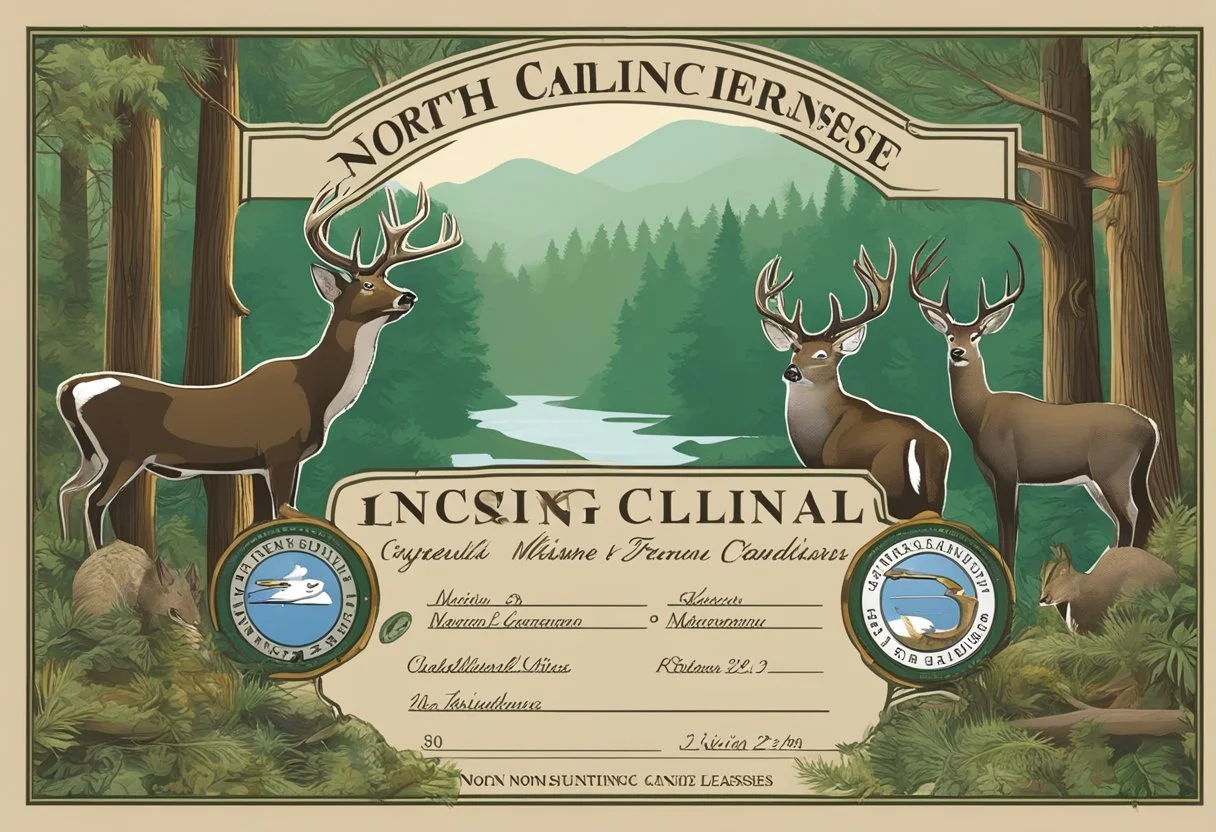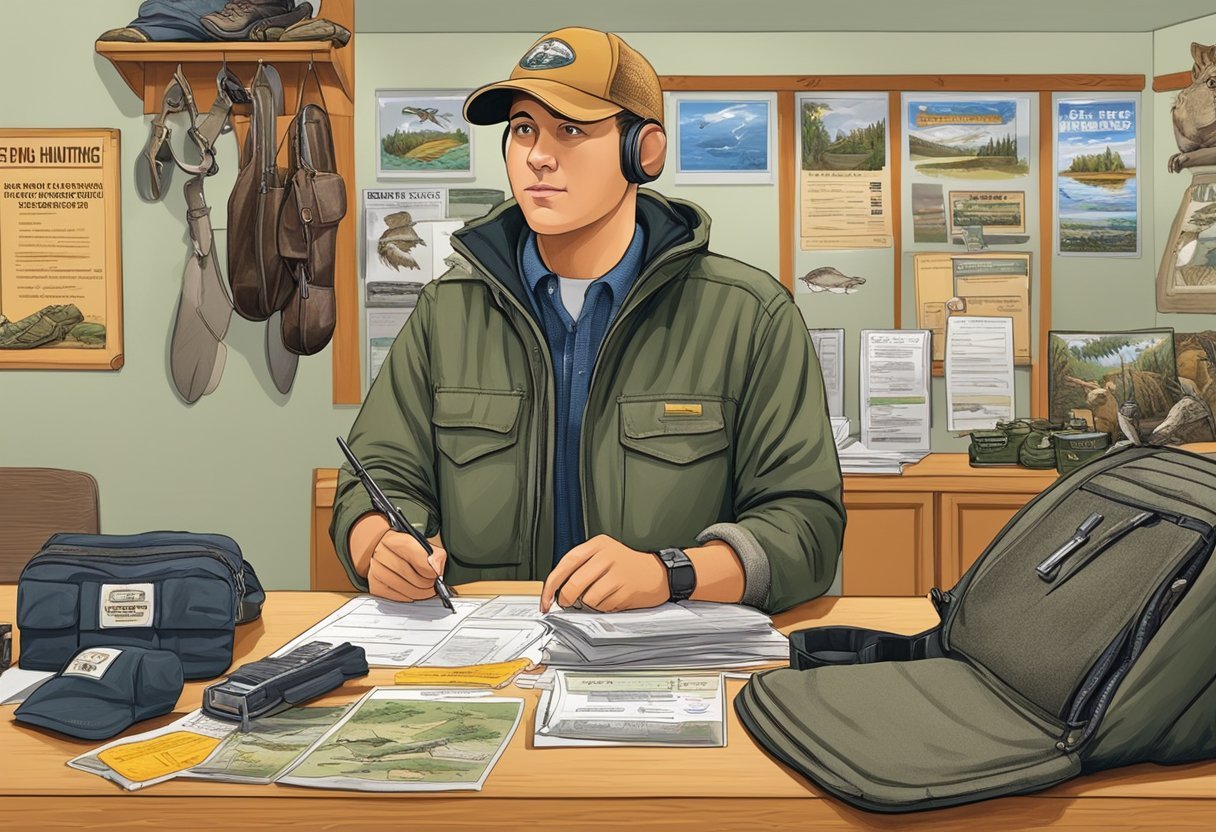How to Get a North Carolina Non-Resident Hunting License
Your Guide to Obtaining Permits
This Article is Part of Our Guide to Non Resident Hunting Licenses by State
North Carolina offers diverse wildlife and expansive habitats, making it a prime destination for hunters from outside the state. To engage in hunting activities, non-residents must obtain the appropriate hunting licenses. These licenses are crucial to ensure lawful hunting and contribute to the state's conservation efforts.
The state provides specific licensing options for non-residents that cater to different hunting needs and durations, including lifetime, annual, and short-term licenses. Each license type outlines the kinds of game that can be legally pursued, and some options include the big game privilege necessary for hunting larger wildlife. Hunting on game lands is also permitted under certain licenses, expanding the opportunities for non-residents to experience North Carolina's hunting grounds.
Prospective hunters are required to follow the licensing process, which includes purchasing the relevant license and understanding the associated regulations, such as the need for an additional bear management e-stamp for those intending to hunt bear. The North Carolina Wildlife Resources Commission oversees this process and provides resources and applications to streamline obtaining a non-resident hunting license.
Basics of Non-Resident Licensing
Navigating non-resident hunting licenses in North Carolina involves understanding the spectrum of available licenses, fee structures, and purchase points. With different types of licenses applicable to various hunting activities, non-residents must adhere to the defined regulations and prerequisites.
Residency Definitions
Non-residents are individuals who do not qualify as residents of North Carolina. Residency is typically determined by one's permanent address and duration of living within the state's border. These definitions are crucial since license types and fees differ significantly between residents and non-residents.
Types of Non-Resident Licenses
North Carolina offers several license types for non-residents:
Annual Hunting Licenses allow for a full year of hunting activities within the state.
Short-Term Licenses, such as the 10-Day Pass, provide temporary hunting rights.
A Lifetime License is an investment for continual hunting privileges.
Comprehensive Hunting Licenses cover statewide hunting, game land access, and big game pursuits.
Important Entities and Certifications
When purchasing a non-resident hunting license, one may need to acquire additional certifications:
Hunter Education proof is typically required for all first-time hunters.
The Harvest Information Program (HIP) Certification is needed for migratory game bird hunting.
For bear hunters, a Bear Management E-Stamp must be obtained.
Waterfowl hunters require a Federal Duck Stamp.
Where to Purchase Licenses
Non-resident hunting licenses are purchasable via:
gooutdoorsnorthcarolina.com, the official online portal.
In-person at Wildlife Service Agent locations throughout North Carolina.
License Fees and Transaction Costs
The cost associated with non-resident licenses varies based on the type and duration of the license. Additionally, there may be a nominal transaction fee for processing. License fees are distinctly different for non-residents, often higher than for resident hunters. Fees are structured as follows:
Annual License: $100.00
Short-Term License: Varies based on length
Lifetime License: Priced dynamically
Transaction Fee: Typically around $2.00
The fee structure is designed to support wildlife conservation efforts while providing access to hunting resources for non-residents.
Regulations and Compliance
The acquisition of a valid North Carolina non-resident hunting license is mandated for any individual seeking to hunt within state borders. Compliance with North Carolina’s hunting regulations, including species-specific rules and reporting requirements, is crucial for lawful hunting activities.
General Hunting Regulations
Non-residents must procure a Nonresident Hunting License along with a Nonresident Big Game Privilege if they wish to hunt big game species. These licenses may be obtained separately or in combination. A Lifetime License that includes the Big Game Privilege is an alternative option for those who hunt frequently. Regulations stipulate that all hunters must adhere to state hunting laws and carry their permits at all times during hunting activities.
Species-Specific Regulations
Hunting laws vary for different wildlife species to ensure sustainable populations. Specific permits are required for hunting:
Bear: Must have a non-resident hunting license plus a bear hunting license.
Deer: Hunters may need additional privileges depending on season and weapon choice.
Waterfowl: Requires both a hunting license and compliance with the Harvest Information Program (HIP).
Wild Turkey: Special regulations apply during spring and fall seasons.
Hunting on Game Lands
Access to state Game Lands requires a valid hunting license. Hunters should be aware that some game lands may have additional restrictions or require a Game Lands License.
Reporting and Harvest Information
Non-residents are obliged to report their Big Game Harvests, including deer, bear, and wild turkey, under North Carolina’s hunting regulations. Compliance with the Harvest Information Program (HIP) is necessary for those hunting migratory waterfowl. These reporting practices help in the effective management and conservation of wildlife populations.
Educational Requirements and Certifications
North Carolina mandates specific educational requirements for non-residents to obtain a hunting license. Compliance with these requirements ensures both the safety of the hunters and the sustainability of the wildlife populations.
Hunter Education Course Requirements
Non-residents must complete a Hunter Education Course if they intend to hunt in North Carolina. There is no minimum age for participation in the course, but the content is designed for a sixth-grade comprehension level. Successful completion of this course is recognized across all North American states and provinces.
Hunter Education Certificate
Upon completion of the Hunter Education Course, individuals receive a Hunter Education Certificate. This certificate is a prerequisite for purchasing a non-resident hunting license, especially for those planning to hunt without a Hunting Heritage Apprentice Permit.
Migratory Bird Regulations
Non-residents hunting migratory game birds in North Carolina must adhere to federal regulations, which require them to carry proof of completion of a Hunter Education Course. Additionally, they must obtain a migratory bird permit and follow the state-specific hunting season guidelines.
Hunting Heritage Apprentice Permit
Non-residents above the age of 16 who have not yet completed a hunter education program may hunt under a Hunting Heritage Apprentice Permit. This permit requires the non-resident to hunt in the immediate presence of an adult who is both licensed and within sight and hearing distance. This provision facilitates learning and safety in real-time hunting scenarios.
Fishing and Trapping for Hunters
In North Carolina, non-resident hunters can take advantage of several license options that allow for a combination of hunting, fishing, and trapping. These licenses are designed to cater to individuals who wish to engage in multiple outdoor activities while in the state.
Combined Hunting and Fishing Licenses
Non-resident hunters in North Carolina may purchase combined licenses that include both hunting and fishing privileges. This option simplifies the process and often provides a cost-saving compared to purchasing separate licenses for each activity. The Nonresident Hunting License and Big Game Privilege are available for varying durations, such as lifetime, annual, or 10-day terms, which can include an Inland Fishing component. For example:
Annual Combined Hunting and Inland Fishing License: $100.00
10-Day Combined Hunting and Inland Fishing License: Price may vary
Coastal and Waterfowl Fishing Privileges
For hunters interested in fishing along North Carolina's coast or pursuing waterfowl, additional privileges are available. These are separate from the standard fishing license and are specifically tailored for coastal waters and waterfowl. Hunters should ensure they obtain the correct licenses for these activities:
Coastal Recreational Fishing License: Required for fishing in coastal waters.
Waterfowl Privilege: Allows hunting for waterfowl species but may require additional federal stamps or certifications.
Trapping License Details
Individuals looking to engage in trapping must be aware of the specific license required for this activity. The Trapping License is separate from hunting and fishing licenses and includes its own set of regulations and fees. Here are the key details:
Annual Non-Resident Trapping License Fee: $100.00
Active status: Must be maintained annually
Trapping licenses cater to those who are participating in the regulated capture of fur-bearing animals and are subject to North Carolina's trapping laws and regulations.
Special Licenses and Permits
North Carolina offers a variety of specialized hunting licenses and permits to accommodate different needs, such as those for individuals with disabilities, military service members, landowners, and those benefiting from reciprocal agreements with neighboring states.
Disability Access and Accommodations
North Carolina provides Disabled Access Permits which authorize individuals with limited physical mobility to operate vehicles, including ATVs, on Commission-maintained property. Lifetime Licenses containing Disability Accommodations are also available for residents with disabilities.
Military and Veteran Licensing Options
Active-duty military personnel stationed in North Carolina and their dependents may obtain hunting licenses at resident rates. Military ID must be presented to qualify. Special Privilege Licenses for hunting are available to veterans and members of the U.S. Armed Forces as well.
Landowner Permissions and Licenses
Landowner licenses are available, offering specific hunting privileges on their own property. This option facilitates hunting activities without the need for standard licensure, easing the process for landowners to engage in hunting on their land.
Reciprocal Licensing Agreements
North Carolina has reciprocal fishing license agreements with neighboring states including Georgia, South Carolina, Tennessee, and Virginia. These agreements permit holders of non-resident licenses from these states to fish in North Carolina waters under certain conditions.
Additional Considerations for Hunters
When planning a hunting trip to North Carolina as a non-resident, it's essential to be aware of the diverse hunting opportunities that vary by region, the specific focus on big game and bird hunting, and the integral role of conservation initiatives led by the North Carolina Wildlife Resources Commission.
Hunting Opportunities by Region
Mountain Region:
Species: Species such as deer, bear, and wild turkey are prevalent.
Hunting Activities: The topography offers challenging hunting excursions.
Coastal Region:
Species: Waterfowl and small game species.
Hunting Activities: The Coastal Plain provides ample opportunities for waterfowl hunting amidst the extensive wetlands.
Big Game and Bird Hunting
Licenses: Non-residents purchasing licenses should consider the Big Game Privilege, which is necessary for hunting species like deer and bear.
Species: Deer and bear are sought after in these regions, requiring careful planning and adherence to regulations.
Bird Hunting:
Birds: Bird hunting enthusiasts can pursue species such as quail (What wine goes well with quail?), pheasant, and turkey.
Hunting Activities: North Carolina offers rich habitats that are conducive to sustainable bird hunting practices.
Wildlife Conservation and Management
North Carolina Wildlife Resources Commission:
They oversee and implement conservation efforts that ensure the sustainability of species and habitats.
Regulations: The Commission provides regulations that govern hunting seasons, bag limits, and the use of hunting lands to minimize the impact on wildlife.
Hunting Activities: Hunters are encouraged to participate in conservation efforts by adhering to set regulations, engaging in ethical hunting practices, and contributing to habitat management programs.
#NorthCarolinaHuntingLicense #NonResidentHunting #OutofStateHunting #HuntingPermits #WildlifeConservation #OutdoorAdventures #HuntingRegulations





